People living the Central Apennines landscapes play a strategic role to keep nature wilder and to show proudly the beauty of the region. Raising awareness and support of stakeholders and people of the country are of great importance for the conservation of Central Apennines ecosystems.
Involving people in rewilding

Life can be often hard in Central Apennines. The power of the mountains can test even the toughest people, here. Isolation can be a burden and the necessity to make a living has often led in the past not to be gentle to nature. Thankfully, things are changing in the last few years and a new social and environmental awareness is rising: at its base there is a renovated interest in the wilderness and a positive attitude to investigate alternative ways to generate new economies based on the rewilding principles.
Some people, by working with us, can reconnect themselves to nature in their own way. For example, some residents help us to remove barbed wire in the mountains or building electric fencing by using their own vehicles and tools. This is the best way to learn from each other and share a growing feeling of rewilding.
Even the online involvement is important to scale up the rewilding movement. Our project on the citizen-science platform Instant Wild brings people closer to nature by allowing them to view and identify wildlife pictures from the Central Apennines. The more people that participate, the more accurate the identification is.
Bring people on wildlife side

One of our goals at Rewilding Apennines is to engage with local stakeholders in order to develop new nature-based activities and protect wildlife.
In 2020 we created the Bear Fund, which aims to identify and connect wildlife-friendly entrepreneurs and develop personalised product and services – this can create the roots of new economic nature-based activities, such as experiential tourism. This enterprise infrastructure also supports the development of Bear Smart Communities by raising funds to improve bear conservation practices across the ecological corridors in which we operate.
We believe that the more we are able to involve local and visiting people in our rewilding initiatives – through communication, meetings, practical work on the ground – the more effective and accepted they are. Let’s bring people onto the side of wildife by sharing authentic moments.
The Bear Fund
Here at Rewilding Apennines, the Marsican brown bear is a symbol of our constant effort to make the world a wilder and better place. The effort to keep protecting this species is not only a concrete attempt to support a unique animal, but a source of inspiration to generate new economies. Protecting the bear, today, means preserving the future of those territories in which the animal lives.With this premise, we established the Bear Fund with a double goal:
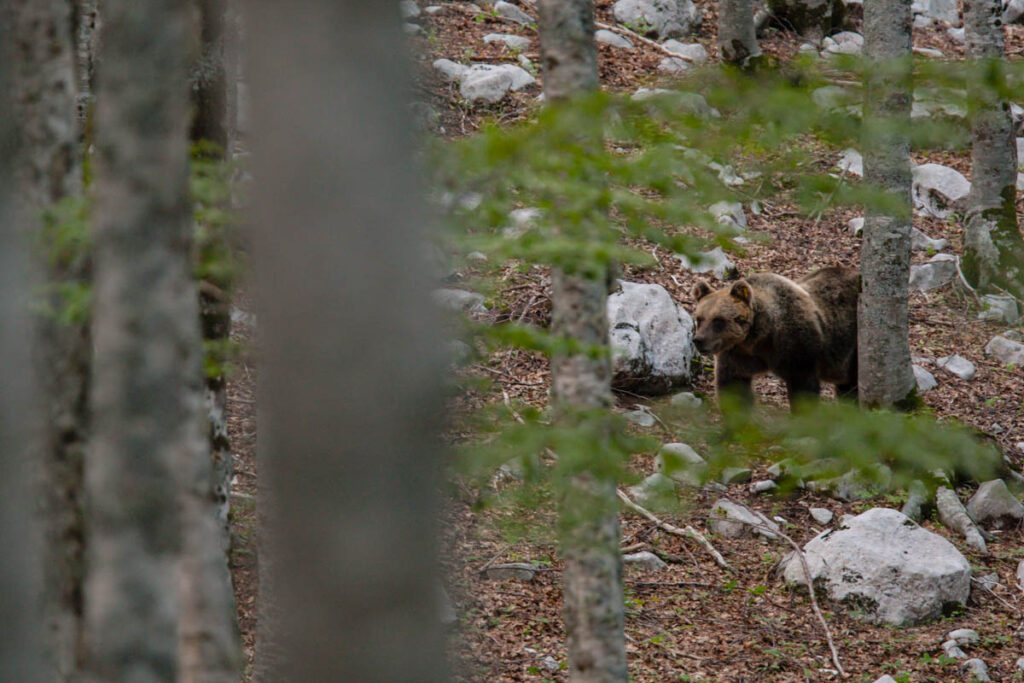
Create a conservation fund which can support and finance actions to protect the Marsican brown bear, a species at risk of extinction, and to develop and promote the Bear Smart Communities as well as those products linked to the enhancement of bears and wildlife in general.
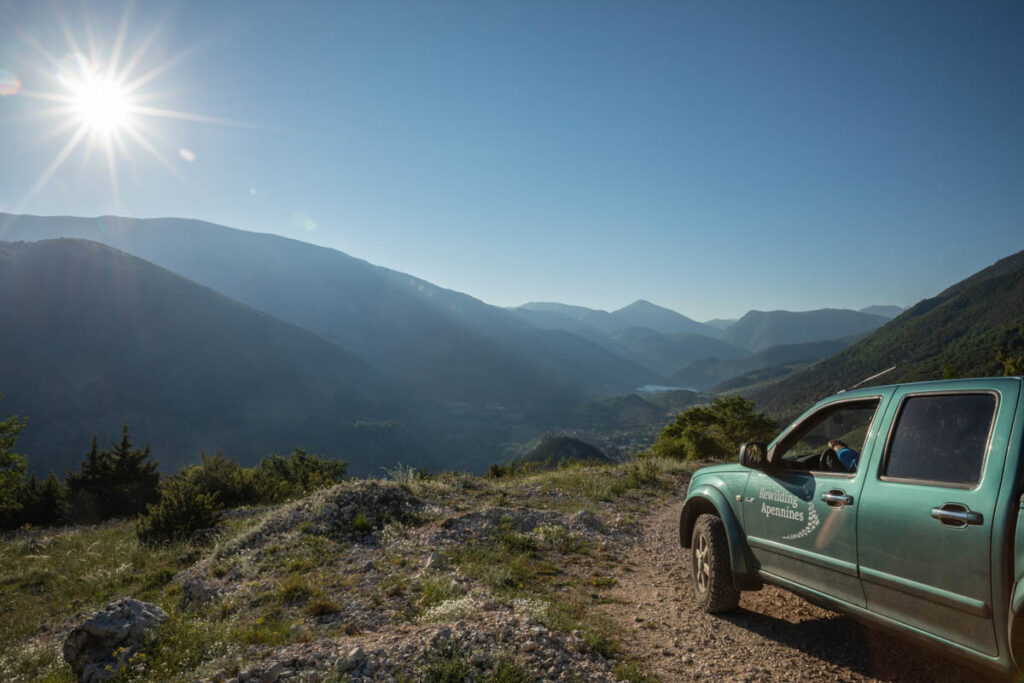
Promote and raise awareness of rewilding practices as an alternative to the current economic model. Our aim is to give rise to a fresh and innovative movement – a rewilding cultural renaissance – to explore concrete alternatives for young people which are currently going back to cultivating the land.
The work that the Bear Smart Communities are doing in the territory seems to be important for raising awareness among a local population whose still very much perceive wildlife through an old-fashioned length, often riddled with negative preconceptions. Because of that, Rewilding Apennines also has a great role in educating the next generation, which will be real custodians of wildlife areas in the near future.
To support the Bear Fund, please donate here!
The strength of volunteering
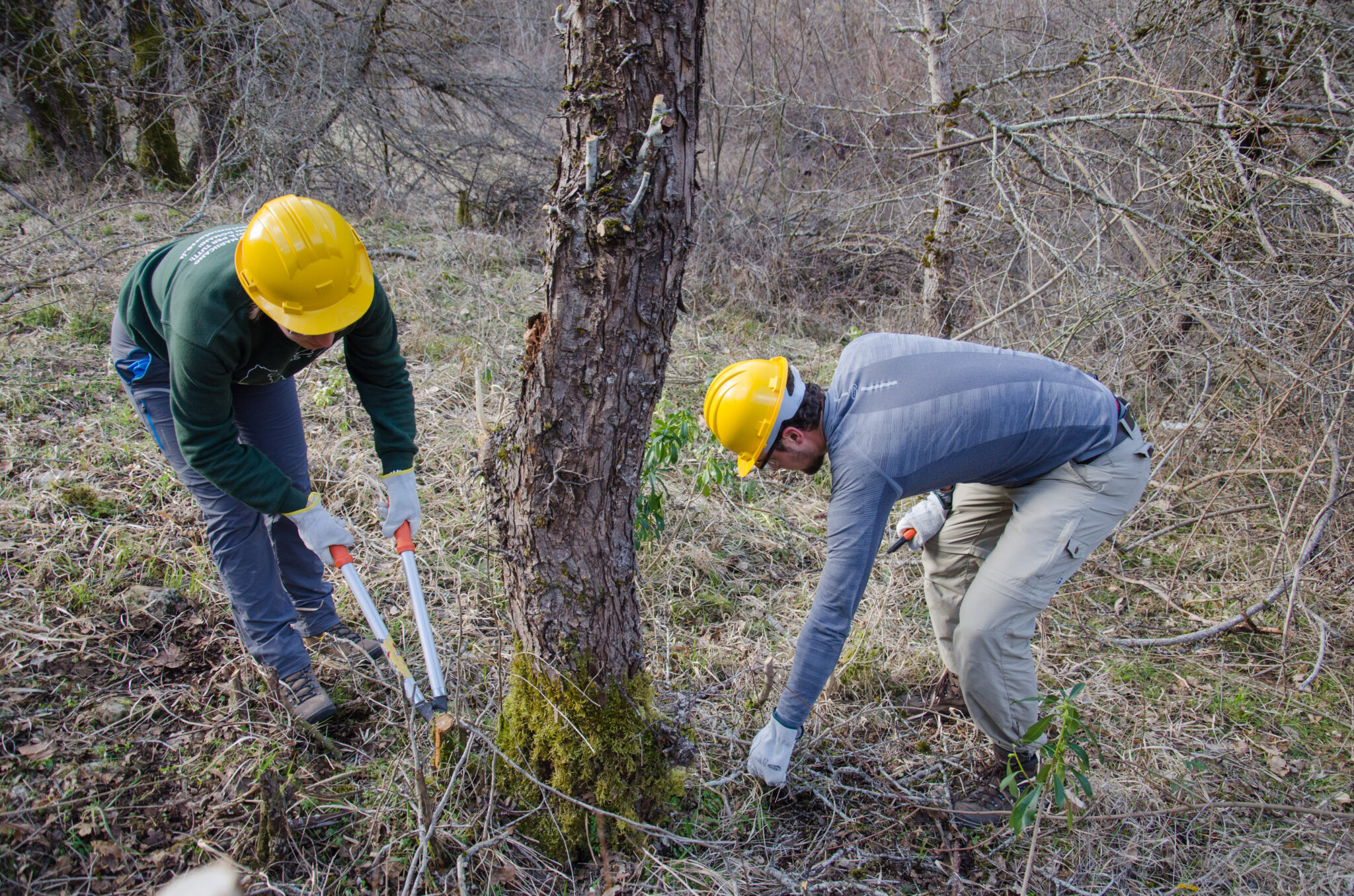
Rewilding the Central Apennines requires a huge effort, even in terms of human resources.Thanks also to its partnership with Salviamo l’Orso, Rewilding Apennines can count on the precious work of volunteers coming from throughout the world who are very interested in the projects for nature conservation. In Central Apennines, their help is valuable for the rewilding landscape by removing barbed wire, helping in wildlife monitoring, setting on the ground the prevention measures for mitigating human-bears conflicts and many more activities.
Thanks to an agreement between Rewilding Europe and Sensing Clues, the monitoring work in Central Apennines is much more valuable in terms of collection, usage and storage of data made by the app Cluey and the volunteers are allowed to use it, with many benefits in terms of learning and helping Rewilding Apennines to monitor the rewilding area.
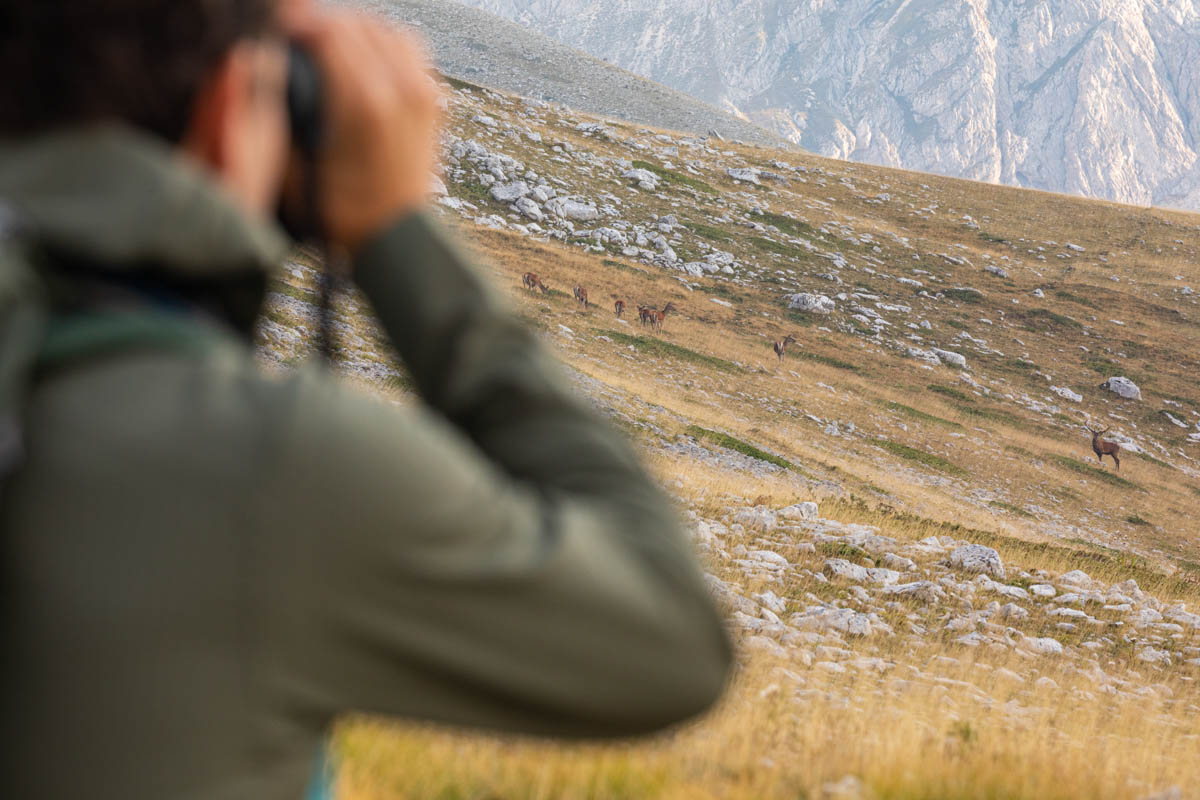
Here are some values behind the volunteers’ passionate work:
- Real help in the field with many tasks
- Increase of the micro-economy of Central Apennines villages
- Friendship with local people beyond the placement period
- Revitalization of depopulated villages with young volunteers
- Increase of positive perception of the bear for locals through the volunteers’ involvement
- Cultural and linguistic exchanges
- Tourist development with friends and families visiting them and volunteers themselves coming back
- Multicultural environment
Discover more about volunteering in the Central Apennines, explore our program and read the information package.
Visit the European Rewilding Network and consider submitting your application to the Rewilding Volunteer Database.
Raising awareness
Generating pride, public support, new partnerships and a more positive attitude amongst stakeholders for a Central Apennines with much more wild nature and wildlife.Effective communication is essential when it comes to changing people’s ways of thinking, building public support, creating positive attitudes and engaging with stakeholders. As Rewilding Apennines, we are committed to reaching out, creating dialogues and involving people from all strands of society. This is an ongoing process and it takes time to change towards a rewilding culture.
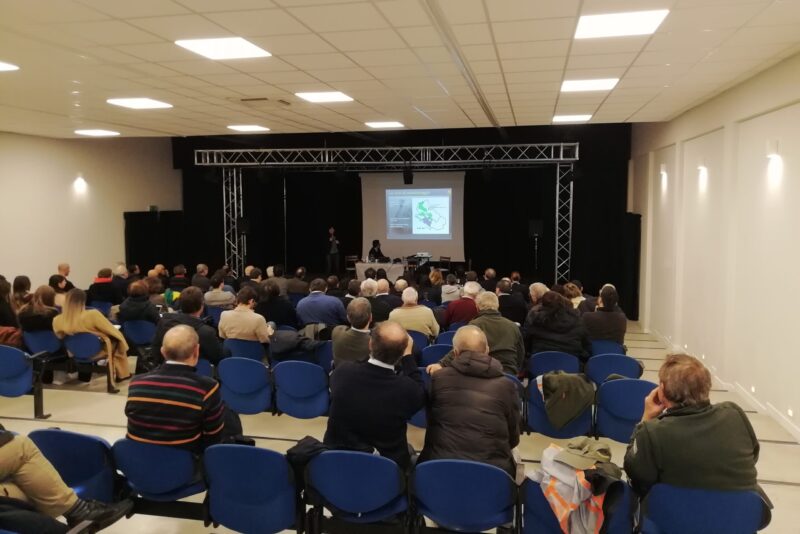
Public meetings
Looking into people’s eyes and shaking their hands are not just social conventions, but are the best ways to get in touch with people we really want to communicate with.
Rewilding Apennines usually organizes thematic public meetings dedicated to local communities, with the aims of speaking about the rewilding approach, making them aware of the nature values and benefits and involving people in the ground activities.
Public meetings are one of the first actions to disseminate the best practices in order to become a Bear Smart Community.
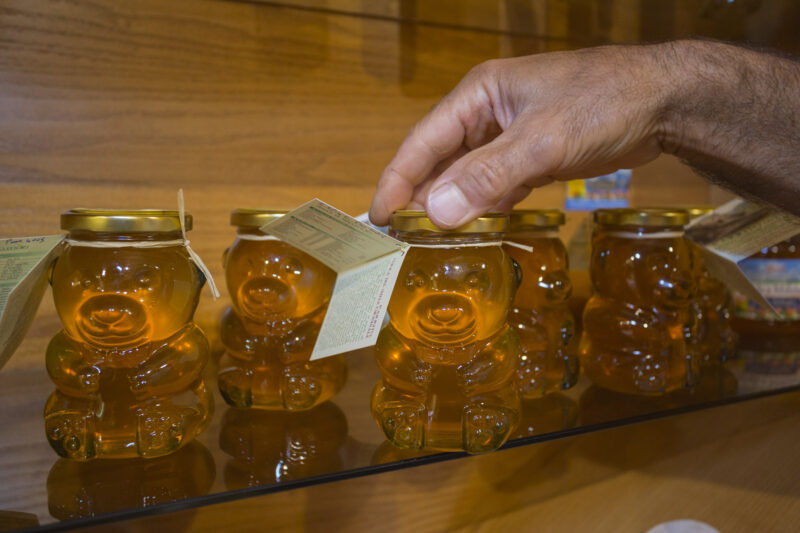
Festivals
In the beautiful villages of Central Apennines, tourists and visitors are always around. To make the rewilding community growing it is important to approach these people through funny and engaging initiatives.
One of this is the Rewilding Social Club, which was born as one of the Bear Fund strategies. It aims to engage with people in the rewilding debate by sharing cooking practices and local produce that belong to the Marsican brown bear diet (such as wild herbs, berries, fruits, honey).
Take a look at our News for participating at our next events!
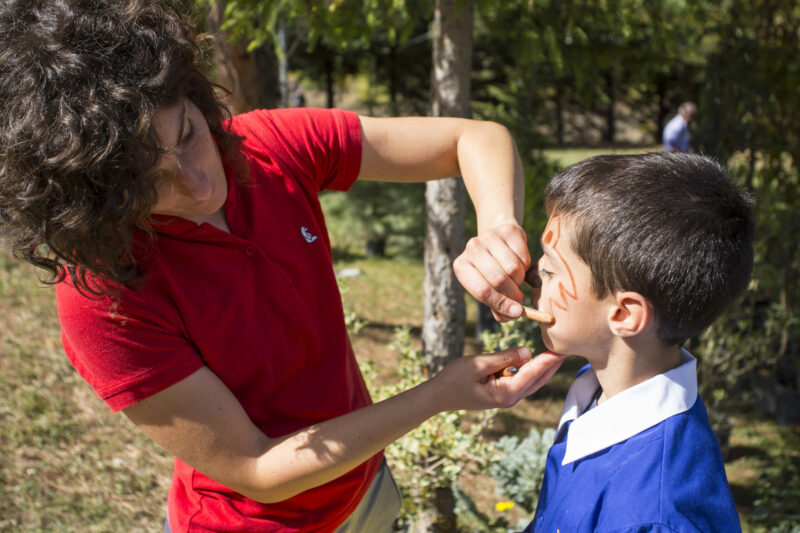
Training and educative activities
Rewilding Apennines organizes educative programs, mostly dedicated to young people and students from Central Apennines communities, because they are the future managers in whose hands we are entrusting our precious natural resources.
Moreover, Rewilding Apennines wants to offer the opportunity to learn from each other and grow together towards the implementation of the best rewilding practice. In this view, Rewilding Apennines organizes the Rewilding Economy Seminar to raise awareness on rewilding practices as an alternative to the current mainstream economic paradigm and to inspire a new generation of entrepreneurs.
Our main achievements
INTEREST IN THE WILD
- In 2014 a leaflet about Rewilding Central Apennines and the Marsican Brown bear project was produced and distributed.
- Several documentary films have been produced about the area, people, wildlife and rewilding opportunities.
- Rewilding activities have been depicted in prominent international magazines and national press.
- A book about wolves was published by Bruno D’Amicis, a professional nature photographer at the end of 2016.
- A 25-minute documentary featuring renowned TV presenter and Dutch Postcode Lottery Ambassador Humberto Tan showcased the Central Apennines rewilding area in 2017.
- In 2017 our partner Salviamo l’Orso was awarded a grant from the European Outdoor Conservation Association for the project titled “Let’s take action for the bear”.
- In 2018:
- RA assisted the directorship of the film enterprise Off the Fence in the logistical preparation and shootings for the documentary series “Europe’s New Wild”, for the episode based in Central Apennines, which has been aired in September 2020 by National Geographic.
- Some dissemination events were organized in order to sensitize the local communities, for example in San Pietro Avellana, in the Alto Molise corridor, where a female bear with three cubs raided a few chicken coops during the autumn and residents were not prepared to face these events; and the “Celebration of Hibernation” in Bisegna to communicate people to know bear’s behavior and mitigate conflicts.
- In 2019:
- 6 public meetings for local communities have been held (Ortucchio, Vastogirardi, Pescolanciano, Carovilli, Luco dei Marsi and Capistrello).
- 2 events in the squares (Sulmona and Pescasseroli) to meet local people, children and tourists.
- 5 days with schoolchildren have been organized in the Bear Museum in Pizzone (around 150 children in total) and a special event called “A night in the Museum” has been organized for around 25 children and their families from the local communities. Also, hundreds of people were met during the Sunday openings at the Bear Museum in Pizzone.
- 1 outdoor event with students was carried out in the Montedimezzo State Nature Reserve and BR core area (corridor Alto Molise).
- An Italian student (Arianna Calderamo) carried out her internship with Rewilding Apennines.
- 4 information panels on the Bear Smart Community Genzana were produced and posted in Pettorano sul Gizio (corridor Genzana); about 1,000 booklets about best practices of human-bear coexistence were delivered in local communities living with bears.
- In April the RA team leader assisted the film enterprise Off the Fence in the logistical preparation and shootings for the documentary series “Europes’ New Wild” in the Monte Genzana Alto Gizio Regional Reserve.
- In June, the professor of Environmental Philosophy Christopher Preston, from University of Montana, came to visit the Central Apennines area and took inspiration for an essay about the “rewilding in practice” from our field work. The article has been published on The Atlantic on April 2020.
- In June, the French-German television “ARTE”, which was producing a documentary about the coexistence between the man and the bear throughout Europe, filmed bear-proof waste bins, electric fences and wildlife warning reflex reflectors as effective best-practices.
- In Autumn a special guest came to visit the Central Apennines area to understand our work for nature and Marsican brown bear conservation, and to write an article about it for The Independent: the journalist Stanley Johnson, the UK Prime Minister’s father.
- Rewilding Apennines and the Zoological Society of London became partners of the citizen science project “Instant Wild”. The aim is to involve as many people as possible in important projects of wildlife conservation around the world, and one is in the Central Apennines, by sharing many and spectacular photos and videos from extraordinary places of our Planet on the Instant Wild platform! In partnership with Salviamo l’Orso and the Gole del Sagittario Nature Reserve and WWF Oasis, thousands of pictures from camera traps were shared for the cause.
- In 2020:
- Two public meetings, one for local communities and other one for international public, were held.
- No events and activities for students and general public were carried out because of the restrictions of Covid-19 pandemic.
- From May 2020, the new column “Three questions for Rewilding Apennines” was launched on all the RA social media to help people understand the rewilding concept through interviews with people who live and work in Central Apennines. 13 interviews have been published.
- Development and dissemination of the Earth Day communications campaign for Organic Basics, which sponsored the Central Apennines rewilding area.
- Development of the communication actions for the Life Bear Smart Corridors project.
- On the Rewilding Europe website, 5 news items were dedicated to the Central Apennines rewilding area. In the Rewilding Europe Annual Review 2019, two articles were dedicated to the Central Apennines rewilding area.
- In the national press, 11 news items were published about RA.
- In the international press, 9 news items were published about RA.
- 4 wildlife-related workshops were given by biologist Irene Shivij to RA & SLO volunteers.
- Communications around the TV series “Europe’s New Wild”, co-produced by Rewilding Europe. The series premiere was launched in Italy on September 3 by Nat Geo Wild, with the episode “Saving Europe’s Bears” profiling the Central Apennines rewilding area.
- Rewilding Apennines organised the Rewilding Economy Seminar (October 1-4) in the Genzana Bear Smart Community, with many partners and funding from Organic Basics. Promotional materials and actions at national and international level were developed. Ten entrepreneurs attended the training initiative and many national and international participants were involved.
- In November, an online meeting with the Italian members of the European Rewilding Network was organised with the aim of exploring potential future projects to work on together.
- In 2021:
-
- We fostered a successful collaboration with LIFE-Il faro dei curiosi, an online science dissemination account conducted by young biologists.
- We organised several local events for the Bear Smart Communities such as: The Night of Biodiversity, a night event to involve public and spread the biodiversity values with different activities in the Bear Smart Community Alto Molise, and in the Bear Smart Community Genzana we dedicated the World Environment Day to the “Bear’s Pathway” and also had theatre performances of “The Boy and the Bear” by the artists Antony Hequet and Nadine Rennert. A Rewilding Social Club event also took place in 2021 involving the local communities.
- A public meeting to present the best practices of man-bear coexistence to the Bear Smart Community Valle Roveto happened in September 2021 in partnership with Salviamo l’Orso and Le Aquile Ambientali.
- 7 webinars took place in 2021 in which we invited our followers and friends for online sessions with the team and special guests, focusing our discussion on coexistence, responsible tourism and ecosystem services.
SCALING UP REWILDING
- One of the main goals is to improve the situation for the Marsican brown bear. This work will be carried out in three communities strategically located at the northern border of the Abruzzo, Lazio and Molise National Park, which is still home to many of the 50-60 remaining bears. Among the planned activities is the long-term lease of a critical area in order to mitigate existing problems with poisoning, poaching and transfer of disease from livestock.
- Since 2015, thanks to a strong partnership (Salviamo l’Orso, Rewilding Apennines, Monte Genzana Alto Gizio Nature Reserve, Dalla Parte dell’Orso, Municipalities of Pettorano sul Gizio and Rocca Pia) a new model called Bear Smart Community has been implemented, firstly in the Monte Genzana Alto Gizio Nature Reserve (BSC Genzana), in order to promote actions to prevent human-bear conflicts, by removing food sources for the bear in built-up areas and by promoting simple but effective measures to prevent damage from and to the bear.
- From 2015 to 2018, thanks to the BSC Genzana, more than 100 farms (about 90% of the total) were protected in the territory of Pettorano sul Gizio and Rocca Pia.
- In 2018, the BSC model has been exported in Alto Molise corridor. Since then, Salviamo l’Orso and Rewilding Apennines:
- Installed 7 electric fences and 3 bear-proof metal doors and 2 bear-proof chicken houses.
- Compensated a total of 3,200 € of bear damages.
- Organized some public meetings to raise awareness of the local communities and educational activities with pupils in the field.
- In 2019, the BSC model has been spread also in the Valle Roveto-Ernici corridor:
- 8 electric fences were installed to protect 4 apiaries and 4 livestock farms.
- A study, still under review, on the biological permeability of State Road 690 was conducted with signs of presence reported and a bear recorded by one of the project’s camera traps.
- Two meetings with local communities were held.
- In 2020:
- SLO volunteers and the RA Bear Ambassador installed electric fences in the Molise Region.
- Young Cypriot filmmaker Constantinos Christou raised awareness of the Bear Smart Communities and RA with 15 videos (5 not published yet). The quality of these video has impressed RE’s Head of Communications, who asked Mr. Christou an agreement for the free use of his footage.
- Networks built through a series of meetings with local stakeholders (Forestry Carabinieri, Monte Genzana Alto Gizio Nature Reserve, Zompo Lo Schioppo Nature Reserve and the Abruzzo, Lazio and Molise National Park) for joint monitoring efforts of the Marsican brown bear and wild cats, reintroduction of the Apennine chamois and the white-clawed crayfish, and the scaling up Bear Smart Communities.
- A MoU between RA and the Monte Genzana Alto Gizio was signed in June.
- An agreement was signed with Io non ho paura del lupo and Salviamo l’Orso related to human-wildlife coexistence.
- In 2021:
- An agreement with Forestry Carabinieri was signed regarding management of a vulture feeding station and vulture monitoring activities.
- The funding opportunities received from Fondation Ensemble, European Outdoor Conservation Association and La Passerelle Conservation Foundation will boost our actions linked to keystone species such as the griffon vulture, the Apennine chamois and the white-clawed crayfish.
- The LIFE Bear Smart Corridors grant was awarded at the end of 2021 and the complex work to strengthen bear-human coexistence in the Central Apennines will start in 2022.